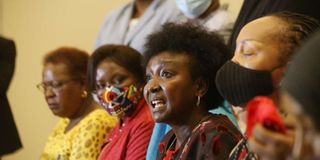BBI, 2/3 gender rule should remedy structural violence against women

Woman representative for Uasin Gishu County Gladys Boss Shollei (centre) with Inua Mama members when they sought the amendment of issues touching on women in in the BBI report, at a Nairobi hotel on November 4, 2020.
What you need to know:
- The BBI and the two-thirds gender rule debate should make it clear that women in Kenya are not only interested in numbers, but equal representation.
- When the tenets provided for by the Constitution are upheld, the calibre of leaders that will ascend to leadership will exhibit servant leadership as their key driver.
- We are looking to a Kenya with more of the under-represented groups in positions of leadership in Parliament, the Judiciary and in the counties.
- Kenya cannot ascend the desired developed country ranks with policy and legislative frameworks and practices that perpetuate exclusion.
The Building Bridges Initiative (BBI) and the two-thirds gender rule debate should make it clear that women in Kenya are not only interested in numbers, but equal representation. This way, they will be able to influence decisions that affect the quality of women’s life, including those abled-differently.
There has been a lot of focus including fights and near-fights on the two-thirds rule and the formula of implementation, and whether we need it, anyway.
For those asking what the benefit will be for women and other under-represented groups, we anticipate that when the tenets provided for by the Constitution are upheld, the calibre of leaders that will ascend to leadership across the country will not only increase in terms of numbers for women and other excluded groups, but that those leaders will exhibit servant leadership as their key driver.
Safe environment
They will be leaders whose agenda will be to ensure the quality of health services, education, infrastructure is standard and consistent across the country. This will in turn facilitate women and men equally to pursue their livelihoods and realise their potential to the best of their abilities because they have been empowered to do so.
We are looking to a Kenya with more of the under-represented groups in positions of leadership in Parliament, the Judiciary and in the counties. One that creates a safe environment, free from violence against women and girls, ensuring girls can go to school without fear of being married off before completing their education.
Cynics have asked how an increase in numbers will change prevailing circumstances. To be clear, the provision of the gender rule is a foregone issue – we already secured it in the Constitution. The ‘how’ in terms of implementation is what requires sobriety by persons of goodwill.
Cost of exclusion
Opponents of the same simply serve to deviate attention from the real issues and before we know it, BBI has happened and women and girls become the biggest casualties.
Sceptics should ponder this – development is a process and the women and girls of Kenya are intelligent enough to know that an increase in numbers will not automatically translate into better outcomes. However, they know the long-term benefits of being at the table, contributing to those decisions.
The cost of exclusion should be understood to not only affect the under-represented groups but men as well. The unrelentless push for our due rights as women is, therefore not misplaced or a competition, but actually driven by the overall good for this country. Kenya cannot ascend the desired developed country ranks with policy and legislative frameworks and practices that perpetuate exclusion.
Excluded from the table
Other cynics have said if women so badly want more seats, they should compete for them on equal ground given that ‘women have the numbers’.
This group should understand the difference between equity and equality, and why it is important to acknowledge and correct the implications of historical practices of exclusion of women from leadership roles.
So will the two-thirds gender rule application change anything? Not immediately. Some gains will be realised sooner than others. We must start now by according the spaces to those that have been excluded from the table.
When it comes to assessment, we shall evaluate all of them as leaders not as men or women. We cannot continue to use the excuse of ‘what have the few women in leadership done to warrant their increase’ because the reverse then holds- ‘what have the majority of men in leadership done to warrant their continued dominance?’
These kinds of arguments and counter-arguments are not constructive. Let us keep our eyes uncompromisingly on the prize, by upholding the principle and practice of equality in all sectors or in my speak, remedying the structural violence against women and girls.
The writer is the executive director, Coalition on Women Against Violence (Covaw). [email protected]




